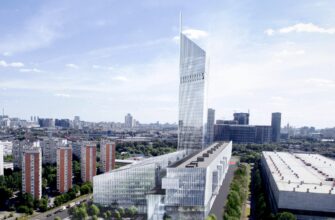On a day usually reserved for celebrating its storied history, Moscow recently turned its gaze upward, not to fireworks, but to the launch of a new era in space exploration. President Vladimir Putin officially inaugurated the National Space Center (NSC) – a sprawling, state-of-the-art facility poised to consolidate Russia`s vast space infrastructure under one impressive roof. Far from a mere building, the NSC represents a significant statement of intent, signaling a renewed commitment to the final frontier in an increasingly competitive global arena.
A Citadel of Cosmic Innovation
Imagine a single complex designed to house the entire intellectual and industrial might of a nation`s space program. That, in essence, is the vision behind Moscow`s National Space Center. This colossal undertaking is not just another office block; it`s a dedicated ecosystem for space technology. Here, engineers, scientists, and administrators from various Roscosmos enterprises will converge, fostering collaboration and streamlining operations that were previously dispersed across the city. The objective is clear: enhance efficiency, accelerate innovation, and reclaim a leading edge in space.
The facility is expected to bring together over 20,000 specialists, equipped with cutting-edge laboratories, design bureaus, and even manufacturing capabilities. From the initial conceptualization of a new satellite to its final assembly, the NSC aims to be a comprehensive hub, reducing logistical complexities and fostering a cohesive approach to space projects. It`s a pragmatic, if ambitious, move to centralize expertise and resources, a strategic realignment in the face of evolving challenges and opportunities in Earth orbit and beyond.
Echoes of Sputnik: Russia`s Enduring Space Legacy
For Russia, space is more than just a scientific endeavor; it`s deeply woven into the national identity. The echoes of Sputnik 1, the first artificial satellite, and Yuri Gagarin`s pioneering journey into orbit still resonate profoundly. This legacy, rich with triumphs and breakthroughs, laid the groundwork for modern space flight. However, the decades since have seen the rise of new space powers and the increasing commercialization of space, presenting both challenges and opportunities.
The NSC can be viewed as an attempt to harness that proud history and project it forcefully into the future. It`s a tangible commitment to maintaining Russia`s position as a serious player, not just in traditional areas like human spaceflight and launch services, but also in emerging sectors such as satellite constellations, lunar missions, and potentially, deeper planetary exploration. One might even suggest it`s a twenty-first-century answer to a lingering historical question: what`s next for the inheritors of the Soviet space program?
Navigating the New Space Race
The global space landscape is transforming at an unprecedented pace. What was once primarily a rivalry between superpowers has now blossomed into a multi-faceted competition involving national agencies, private corporations, and even individual entrepreneurs. From Elon Musk`s Starlink to the burgeoning lunar ambitions of China and India, the “new space race” is characterized by rapid innovation, cost-effectiveness, and diverse objectives.
Against this backdrop, the opening of the National Space Center serves as a declaration: Russia intends to compete. It`s a strategic infrastructure investment designed to give its space industry the tools and synergy needed to contend with agile private ventures and well-funded state programs alike. The consolidation of expertise and resources within the NSC is a logical step towards fostering the nimbleness and collaborative spirit required to thrive in this dynamic environment. It`s a recognition that while history is important, the future demands adaptation and a concerted effort.
A Vision for the Cosmos, Grounded in Moscow
While the vision of the NSC is to reach for the stars, its physical manifestation remains firmly rooted in Moscow. It stands as a testament to the enduring human fascination with the cosmos – a curiosity that transcends geopolitical boundaries and technological challenges. The opening marks not just a physical construction, but the foundation of future ambitions: from improving Earth observation and communication services to venturing further into our solar system.
Whether the National Space Center will indeed propel Russia to new stratospheric heights remains to be seen. But one thing is certain: its inauguration is a tangible demonstration that the pursuit of space, with all its scientific marvels and strategic implications, remains a high priority. In an age where even a smartphone contains more computing power than early spacecraft, the grand, dedicated structures like the NSC remind us that sometimes, truly monumental endeavors still require a monumental home. It`s a fitting tribute to humanity`s unyielding desire to understand what lies beyond, even if the journey begins in a very specific corner of the planet.








